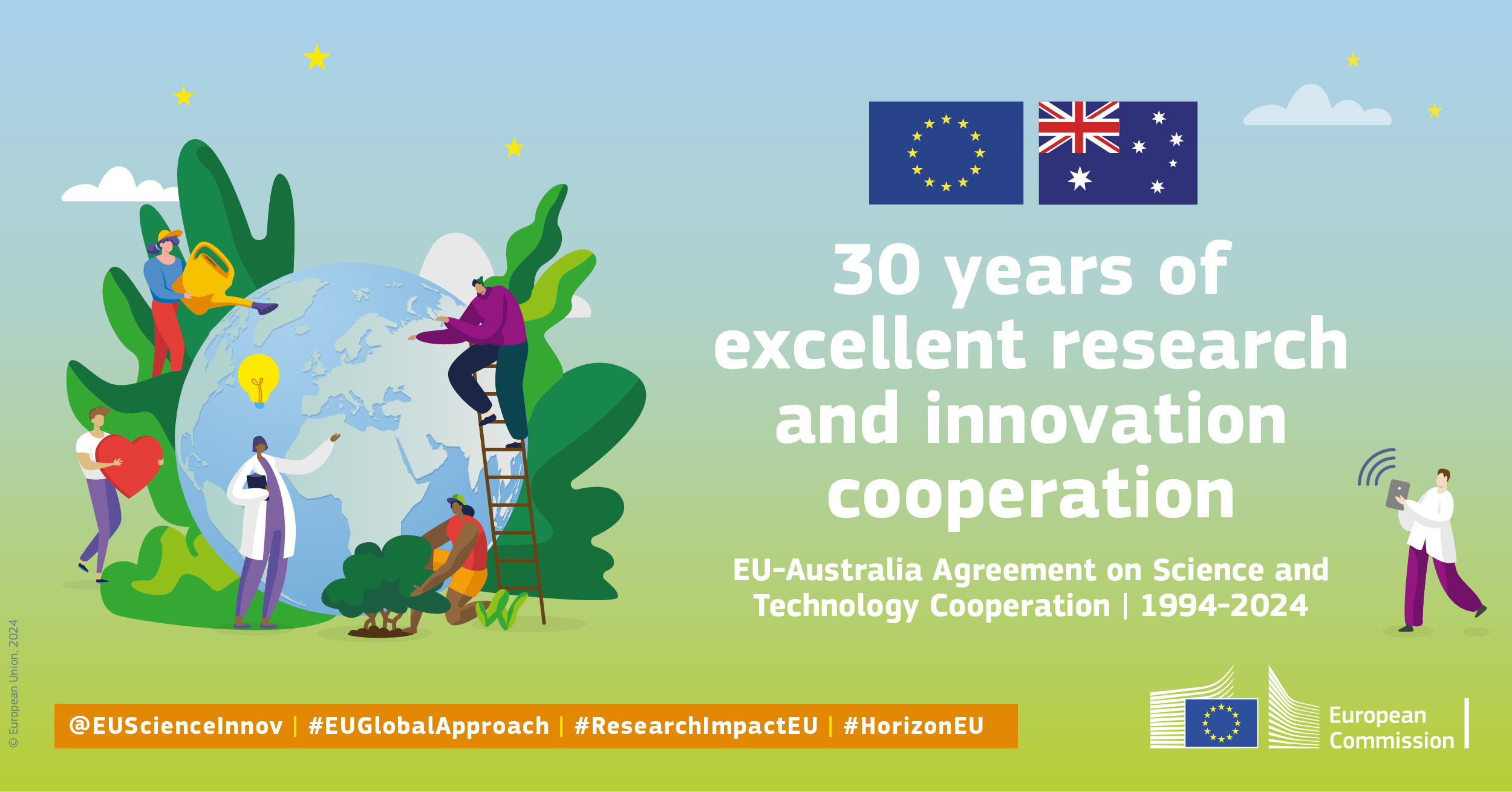Policy background
The EU and Australia enjoy a strong, dynamic, and continuously evolving partnership. The relationship is currently based on the 2008 European Union-Australia Partnership Framework, a comprehensive statement of shared values and close historical, political, economic and cultural ties. As the relationship has evolved, the EU and Australia have moved to upgrade bilateral ties.
To this end, in 2017 the EU, its Member States and Australia signed the EU Australia Framework Agreement.
Science and Technology Agreements and arrangements

Australia and the EU have a long history of productive research collaboration: the first treaty-level science and technology agreement signed by the EU with an industrialised country was the Agreement on Science and Technology Cooperation signed with Australia in 1994 (and amended in 1999). 2024 marks 30 years of research and innovation collaboration under this agreement.
Bilateral research collaboration priorities are set and cooperation is monitored under this Agreement at Australia-EU Joint Science and Technology Cooperation Committee (JSTCC) meetings. The last meeting took place in Brussels on 11 April 2024. The next joint meeting should take place in 2026 in Canberra.
JSTCC meeting in Canberra (July 2019)
The Copernicus technical operating Arrangement was signed in 2016 to improve the performance of ocean models and sea surface temperature analyses, drought monitoring, flood forecasting and agriculture.
The European Commission has signed an Implementing arrangement with the Australian Research Council (ARC) to provide opportunities for ARC funded ‘Discovery-early-career-research-award’ (DECRA) recipients to pursue research collaboration with European researchers that are funded by the European Research Council. It has also signed an Implementing Agreement with the National Health and Medical Research Council (NHMRC) to provide similar opportunities for NHMRC funded researchers.
Areas of Cooperation
The EU and Australia have engaged in very productive collaboration during the last years in areas such as health, food and natural resources, energy and transport, space, research infrastructures and researchers’ mobility.
Cooperation and funding opportunities
Horizon Europe is the biggest EU research and innovation programme ever with more than €95.5 billion of funding available over 7 years (2021 to 2027). It is open to the world, which means that participants from all over the world can participate in most calls.
In principle*, the EU does not provide funding for the participation of Australian research entities in collaborative research projects, however the National Health and Medical Research Council–European Union Collaborative Research Grant Scheme supports participation of entities established in Australia in international collaborative research under Horizon Europe.
Australian researchers may of course also participate in Horizon Europe with other funding.
*In exceptional cases, the Commission or the relevant funding body may consider that the participation of a legal entity is essential for implementing the action (Article 23.2(b) of the Horizon Europe Regulation)
In addition, Australian researchers are eligible for EU funding through the European Research Council and Marie Skłodowska Curie Actions (see below).
European Research Council
The European Research Council offers grants to researchers in all research domains for frontier research. Australian researchers are welcome to apply and if selected are eligible for funding to establish a research group in Europe. Grants are available for researchers starting or consolidating their independent career and for advanced researchers. Synergy grants are also available, where a group of 2-4 Principal Investigators (PIs) may include one PI outside the EU or countries associated to Horizon Europe, to tackle together an ambitious research problem, with all funded by the ERC.
The European Commission has signed an Implementing arrangement with the Australian Research Council (ARC) to provide opportunities for ARC funded ‘Discovery-early-career-research-award’ (DECRA) recipients to pursue research collaboration with European researchers that are funded by the European Research Council. It has also signed an Implementing Agreement with the National Health and Medical Research Council (NHMRC) to provide similar opportunities for NHMRC funded researchers.
Marie Skłodowska Curie Actions
Marie Skłodowska Curie Actions offer fellowships for post-doctoral researchers from Australia (and other countries) to spend up to 2 years in a European group – or for European researchers to spend up to 2 years in an Australian lab. Also offers opportunities for Australian institutions to participate in Doctoral Networks and Staff Exchange consortia (Australian institutions are self-funded in Doctoral Networks and Staff Exchange).
Projects and results
EU-funded research projects involving Australia
You can also visit the Horizon Dashboard, which is a one-stop shop for data and statistics on the EU Research and Innovation Programmes – from FP1 to Horizon Europe.
Contact
National Contact Points
National Contact Points (NCPs) provide guidance, practical information and assistance on all aspects of participation in Horizon Europe
Research enquiry service
Contact the research enquiry service to find out more about research in Europe, the EU's research and innovation funding programmes as well as calls for proposals and project funding.
European Commission
RTD-04-ASSIST ec [dot] europa [dot] eu (DG Research and Innovation unit 04: International cooperation)
ec [dot] europa [dot] eu (DG Research and Innovation unit 04: International cooperation)
EURAXESS Australia-New Zealand
Euraxess Australia-New Zealand provides access to a complete range of information and support services for researchers in Australia and the New Zealand wishing to pursue a research career in Europe or looking for collaboration opportunities through Horizon Europe.
Documents
- 11 APRIL 2024
- 23 JULY 2019
- 15 OCTOBER 2018
Latest

- News article
Research and innovation news alert: Over three decades, the collaborative efforts between the European Union and Australia in research and innovation (R&I) have yielded remarkable outcomes across critical domains such as healthcare, sustainable energy, and research data sharing.
- 3 min read
